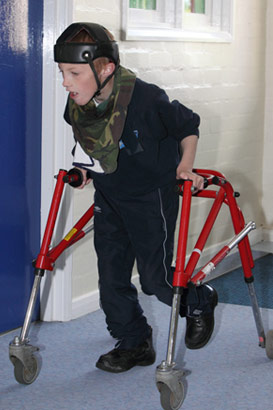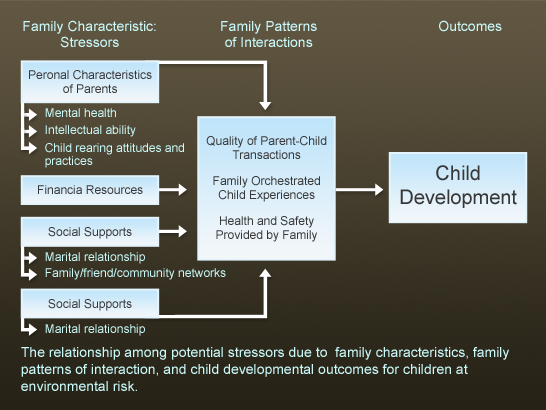There are many lessons to be learned in special education from early intervention practices with families. Models and principles of family functioning and service delivery have been developed to support effective practice in this area.
Aiming high for disabled children: better support for families (HM Treasury and DfES 2007) highlights the need for coordinated support at key transition points, services that can:
- Prevent deterioration of health, stress on parents and siblings, and reception of children into care.
- Provide equipment, short breaks, sleep programmes and support behavioural management.
- Enable the sharing of knowledge and benchmarks of good practice (pp. 35-36).
Based on Newman et al, 2010

Useful initiatives in early intervention include:
- Early Support
- Developmental systems model
- Coaching
Explore the implications of one of these initiatives in depth. What are the implications for the way you and your school works with families?

The agenda for development in early intervention:
- The promise of technology
- Play
- Restoring bonds
- Maximising family patterns of interaction
- Specialist approaches
- Peer interaction
- Siblings
- Recognising fathers
- Involving whole families
- Leadership
- Workforce development
- Strengthening the evidence base
Further resources

Read the following short article on early intervention.
(Carpenter, in Limbrick 2007)
Have a look at the Sherborne Developmental Movement website.

Integral to family systems theory is the primacy of the parent-professional relationship in which decision making and planning around mutually agreed upon goals are shared between parents and professionals who engage in a relationship defined by mutual respect, trust, and honesty.
Dempsey and Keen, 2008
Four key features of the Developmental Systems Model
- To guide Early Childhood Intervention programmes for vulnerable children and their families.
- To maximise family patterns of interaction.
- To address potential stressors related to risk and disability conditions.
- To advocate community-based services.

Taken from Guarlnick, 2001
Coaching
Early intervention providers increasingly coach and collaborate with caregivers
to strengthen and support caregiver-child interactions.
Coaching is:
- Voluntary
- Non-judgemental
- Accountable
- Collaborative
Hanft, Rush and Shelden, 2004
The ‘coaching’ process involves the family and the professional in:
- Initiating
- Observing
- Acting
- Reflecting
- Evaluating
Espe-Sherwindt, 2005
Dempsey, I. and Keen, D. (2008) A review of processes and outcomes in family-centered
services for children with a disability, Topics in Early Childhood Special
Education, 28 (1), 42-52.
Online at:
http://tec.sagepub.com/content/28/1/42.full.pdf+html
Carpenter, B. (2007) Early Childhood Intervention: Evolving Contexts of
Need, in Limbrick. P. (ed.) Family-Centred Support for Children with Disabilities
and Special Needs, London: Interconnections.
Espe-Sherwindt, M. (2005) Another look at 'coaching' families: from theory
to real life!, Paper given to Good Practices in Early Intervention Conference,
University of Coimbra, Portugal (November).
Friedman, M., Woods, J. and Salisbury, C. (2011) Caregiver coaching strategies
for early intervention providers: moving toward operational definitions,
Infants & Young Children, 25 (1), 62-82.
Guralnick, M.J. (2001) A developmental systems model for early intervention,
Infants and Young Children, 14 (2), 1-18.
Online at:
http://depts.washington.edu/chdd/guralnick/pdfs/dev_sys_model_EI_IYC_10_01.pdf
Guralnick, M. (2005) An overview of the developmental systems model for
early intervention, in: Guarlnick, M. (ed.) The Developmental Systems Approach
to Early Intervention, Brookline, MA: Brookline Publishing.
Online at:
http://depts.washington.edu/chdd/guralnick/pdfs/overview_dev_systems.pdf
Hanft, B.E., Rush, D.D. and Sheldon, M.L. (2004) Coaching Families and Colleagues
in Early Childhood, Baltimore, MD: Paul H. Brookes.
Newman, T., McEwen, J., Mackin, H. and Slowley, M. (Barnardo's Policy and
Research Unit) (2010) Improving the Wellbeing of Disabled Children (up to
Age 8) and their Families through Increasing the Quality and Range of Early
Years Interventions, London: Centre for Excellence and Outcomes in Children
and Young People's Services (C4EO).
Online at: